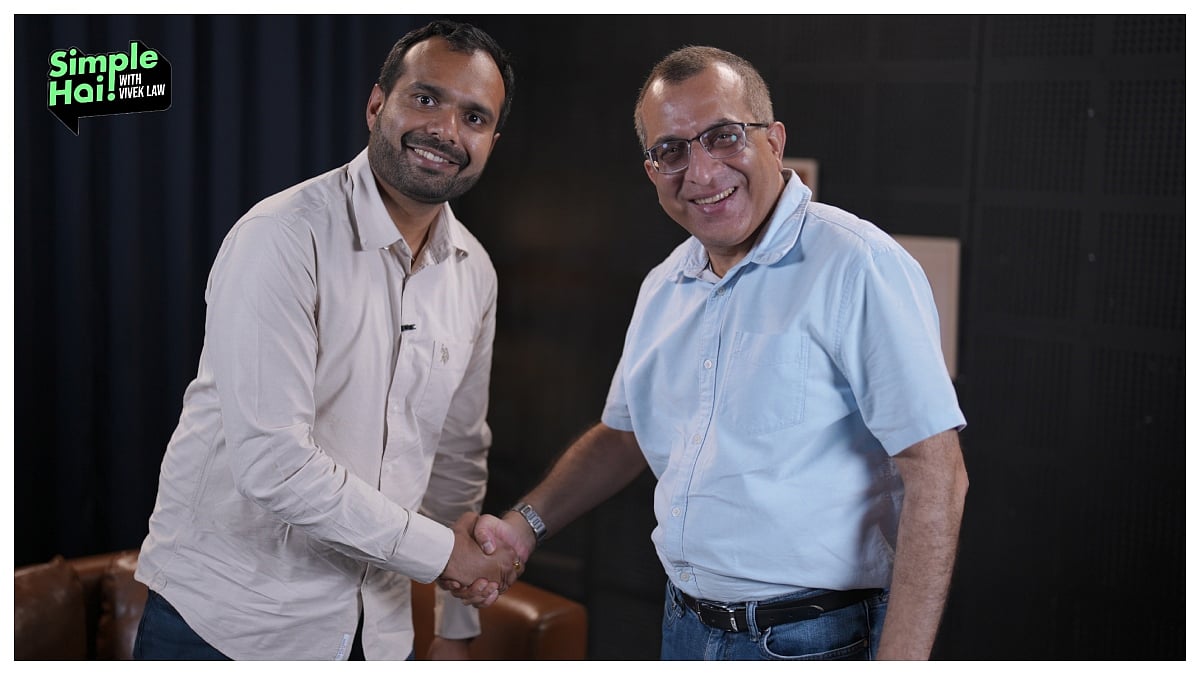At 15, Divam Sharma believed he’d cracked the code. The stock market looked like a shortcut to success—fast, exciting and full of promise. But just a few trades later, the illusion shattered. Futures and options wiped out his savings. The thrill turned into a crash course in humility.
In this episode of the Simple Hai! Visionaries series, veteran finance journalist Vivek Law sits down with Sharma —now the co-founder of Green Portfolio, a ₹650-crore SEBI-registered PMS—to trace the journey from reckless bets to research-backed investing.
How did he bounce back from that early loss? What shaped his approach to managing other people’s money? And what can young investors learn from his hard-won wisdom?
This is not just a story about markets. It’s a story about mindset.
Early Stumbles and Hard Lessons
Sharma began investing in 2005 at just 15 years old, curious and confident. But the initial years were rocky. He admitted to losing ₹1 lakh in the FOMO segment—a heavy loss at the time and a humbling experience.
He also invested in penny stocks, many of which turned out to be hollow promises. Promoters made big claims but failed to deliver, leaving him—and many others—with worthless shares. The early attraction to quick gains slowly gave way to the realisation that investing required more than just guts; it needed groundwork.
Why He Swore Off Futures and Options
The pain of that ₹1 lakh loss stuck with him. When Sharma later launched Green Portfolio, he took a clear stand—no futures and options. That discipline was made part of the company’s onboarding material.
“We didn’t understand FOMO, and we didn’t want to pretend we did,” he told Law. He referred to SEBI data showing that a majority of retail investors in FOMO ended up losing money. Green Portfolio, instead, chose a longer, slower—but surer—path through fundamental equity investing.
How Emotions Undermine Smart Investing
Sharma explained that even seasoned investors struggled when it came to handling their own money. “You can’t detach emotionally,” he said, drawing an analogy to a doctor trying to operate on their own child.
He noted how investors often exited winning stocks too early and clung to losers out of fear or ego. The flood of tips, alerts and noise on social media only worsened this behaviour, leading to impulsive decisions based on headlines rather than fundamentals.
Fundamentals Over FOMO
With time and experience, Sharma pivoted to a fundamental-first approach, spending less time looking at charts and more time studying annual reports, earnings calls and management interviews.
He cited examples like Tata Motors, where a long-term bet that initially dipped later paid off handsomely. “If the fundamentals are intact, don’t panic. But if the business model breaks—get out fast,” he said.
For New Investors: Don’t Stop When the Market Dips
Sharma acknowledged that many new investors had entered during a bull run and were unprepared for corrections. Some stopped their SIPs, others exited in panic. His advice? Stick with it. Use corrections as opportunities to reassess—not abandon—your portfolio. “You need to understand what you own. That’s the only way to hold through the dips,” he said. Education as a Superpower.
Sharma’s academic path included a B.Com, MBA, Corporate Law, Chartered Accountancy, and a Credit Analyst certification. He credited this education for sharpening his ability to analyse companies deeply.
That said, he didn’t believe formal degrees were a must for good investing. “What matters more is your willingness to keep learning,” he noted. “You have to stay curious and disciplined.”
Divam Sharma’s journey offers a compelling reminder that both investing and entrepreneurship are long games shaped by early missteps, steady learning and focused execution. His shift from speculative trading to disciplined, fundamentals-based investing underscores the value of patience, research and emotional control.
Whether you are a new investor or building a business from the ground up, this episode highlights that sustainable success rarely comes from shortcuts—it comes from clarity, conviction and a commitment to continuous learning.
